

Tao Te Ching
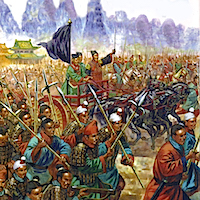
Spring and Autumn period 春秋时代 (770 – 476 BCE)
The Spring and Autumn period began at the beginning of the Eastern Zhou dynasty. It was described in a book said to have been edited by Confucius and called the Spring and Autumn Annals. During this time the central government broke down more and more, the emperor became only a figurehead, and this led to nearly constant, endemic warfare as local leaders took advantage of the kings’ weakness in order to gain more wealth and territory. Hundreds of small, autonomous city-states gained power, the feudal system broke down, and chaos, violence, and instability increased becoming life-threatening to almost all. Some of the larger city-states used “protection” as a ploy to gain control over smaller cities becoming multi-city powers as conflicts spread from against external threats to in-fighting within these localized governments. Sun Zi and his book of strategy, The Art of War helped King Helü win many battles and become one of the Five Hegemons who held power during the last part of this era.
Sages (37)
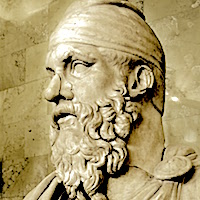
Abaris Hyperboreios βαρις Ὑπερβόρειος
595 – 595 BCE
Legendary sage, Mongol shaman, and catalyst for the beginning of Western Civilization
Abaris Hyperboreios, Skywalker βαρις Ὑπερβόρειος (c. 595 BCE)
Legendary sage, Mongol shaman, ancient ambassador of Eastern Wisdom to the West, “master of incantations,” and “Overcomer of Obstacles;” One of the earliest druids, Abaris became a famous and greatly respected sage in pre-Socratic Greece. Plato described him as a great physician who healed both body and mind, Herodotus depicted him as a magical arrow traveler, and anecdotes written by Pindar, Iamblichus, Pausanias, and Suidas characterized him as sorcerer, prophet, shamanistic missionary, purifier and bringer of balance to the earth. Peter Kingsley links him to the early formation of Tibetan civilization as well as being the soul-brother of Pythagoras, the spark that lifted the Greeks out of their primitive state, and the catalyst for the beginning and momentum of Western Civilization.
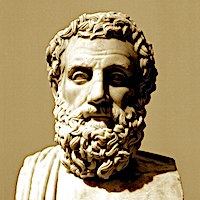
Aeschylus Αἰσχύλος
525 – 455 BCE
The Father of Tragedy
Although Aeschylus was the first to present plays as trilogies, the initiator of many theatrical innovations, and the “father of tragedy;” his Greek epitaph didn’t mention his plays, only his military roles. Although not fully acknowledged in ancient Greece, his influence has seeped through history and into the present as an inspiration for Wagner, Milton, the Romantics, Eugene O’Neill, and Robert F. Kennedy who claimed him as his favorite poet who he quoted in a speech to African Americans after Martin Luther King’s assassination. This same quote—“to tame the savageness of man and make gentle the life of this world”— became inscribed on Kennedy’s memorial after his own assassination. Aeschylus’ costumes and performances were so vivid that they were said to cause children to faint, men to urinate in their robes, and pregnant women to go into labo
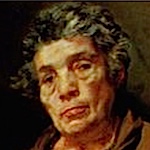
Aesop
620 – 546 BCE
Hero of the oppressed and downtrodden
Known as a strikingly ugly slave who by his cleverness became free and an adviser to kings and city-states, some historians believe Aesop was a black from Ethiopia and became Uncle Remus in the Cherokee, Algonquin and American slave tradition of Br'er Rabbit. In many cultures he symbolizes a hero of the oppressed, disadvantaged and downtrodden who with wisdom and understanding outsmarts and wins over the rich and powerful. Famous throughout the world - from China to Africa, from Europe to Japan, from ancient times until today; Aesop’s fables and sayings remain a profound influence of goodness and insight.
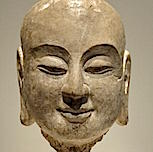
Ananda 阿難
5th C. BCE
"Guardian of the Dharma"
First cousin, close attendant and heart disciple of Gautama Buddha, 2nd Patriarch in the Zen lineage, known as “Guardian of the Dharma” because of his memory and recording of the sutras into the Pāli Canon during the First Buddhist council; Ananda is said to have been the most emotionally closest to the Buddha but the last of his close disciples to become enlightened. Known for his kindness, unselfish thoughtfulness, and service for others; he was responsible for including women in the monastic order and the Buddha’s public recognition of women being equal to men for which he was criticized after the Buddha died.
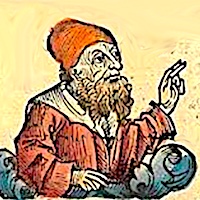
Anaxagoras Ἀναξαγόρας
510 – 428 BCE
“The Copernicus and Darwin of his age”
An heroic philosopher and scientist in a time with few scientific instruments but remarkable scientific discoveries, Anaxagoras introduced the concept of Cosmic Mind, correctly explained eclipses and why the moon shines, theorized about meteors, thunder, rainbows, the sun, and stars. He developed an insightful theory for the evolution of animal and human life and helped create the foundation for Greece’s most lasting scientific insight, the atomic understanding of matter. Immortalized in literature, he became a character in Goethe’s Faust and was quoted by Socrates, Plato, Seneca, Marcel Proust, and Gore Vidal. His genius was not always appreciated though. Dante placed him in Limbo (the First Circle of Hell) and he was sentenced to death because of teaching that the sun is a mass of fire instead of a god.

Buddha गौतम बुद्ध (Siddhartha Shakyamuni Gautama)
563 – 483 BCE
Awakened Truth
While living at about the same time as Lao Tzu, the Buddha was more of a traditional teacher. His teachings, often called Buddha Dharma (“Awakened Truth”) extend and adapt to people in all walks of life: monks, householders, wandering yogis, kings and secular leaders of all kinds. Born into luxury and privilege, Siddhartha realized the meaninglessness of pleasure-seeking, fame, fortune, power and set off on a spiritual quest leading him to the deepest realization and insight. He cautioned against belief systems, herd instinct, and uncritically following leaders, philosophies, and religions.

Cincinnatus
c. 519–430 BCE
Proof that power doesn't always corrupt
Roman politician, military leader legendary for his virtue, and dictator who twice voluntarily gave up all power; Cincinnatus left working his small farm when asked by his country to help during an invasion. An inspiration for generations of Romans and leaders all over the world including George Washington; he took complete control, won a great victory; and then, returning to his farm. relinquished his absolute power. Honored through the ages as example of just leadership and selfless service, his name graces many organizations, streets, plazas and cities including the USA’s Cincinnati.
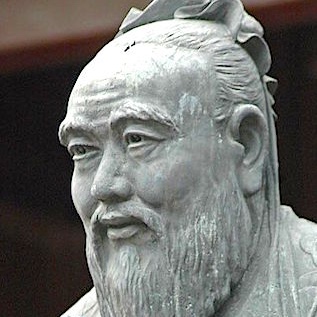
Confucius 孔丘 (Kongzi, Kǒng Zǐ)
551 – 479 BCE
History's most influential "failure"
Probably the most influential failure in history, Confucius wanted to be a political advisor, found only one job doing that but unsuccessfully as was the rest of his life attempts at being an administrator. Early Confucian scholars were killed and their books burned. After he died though, his teaching shaped the next 2300 years of Chinese educational, governmental, and cultural practice. He was the first in recorded history to set up an educational program to train people for governmental roles. Calling himself a "transmitter who invented nothing,” his tradition did not become a religion but instead a non-theistic, humanistic understanding of secular morality that stressed having rulers appointed based on merit rather than birth, rule by personal example rather than fiat, acting out of awareness and experience rather than only following rules.
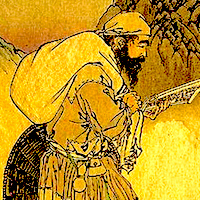
Duanmu Ci 端木赐 (Tzu Kung, Zigong)
520 – 456 BCE
Confucius’ most important disciple
Third of the Twelve Confucian Wise Ones, successful and wealthy businessman, diplomat, and most important of Confucius’ disciples; Duanmu Ci became one of the most accomplished Confucian speakers and the one most mention in the Analects. His accomplishments however led to an arrogance that Confucius criticized along with his lack of empathy and harshness. When he claimed achieving the Confucian ideal, the Master dismissed him from his posts. Confucius later gave him the task of saving their state of Lu from the more powerful army of Qi that was preparing to attack and take over. His strategy and diplomacy saved Lu, significantly change the history of 5 states, and much of that time’s Chinese history. His memorial tablet is traditionally placed on the east side of Confucian temples.
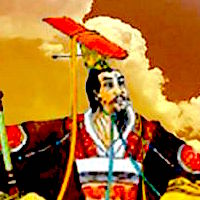
Duke Wen of Jin 晉文公; (Jìn Wén Gōng, Chong'er)
697 – 628 BCE
Innovative political reformer
A ruler during the Spring and Autumn period of ancient China who, after a 19-year period of exile declined the throne and passed it on to his half-brother; Duke Wen’s civil and military reforms created a highly successful, expanding, and stable government that lasted long beyond his life. According to Confucius, he was “crafty but not correct while Duke Huan was correct but not crafty.”
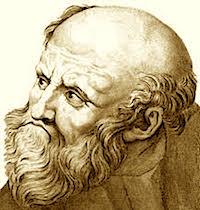
Empedocles
490 – 430 BCE
"The father of rhetoric"—Aristotle
Empedocles Ἐμπεδοκλῆς (490 – 430 BCE)
Brilliant orator, physician, poet, vegetarian, magician, pre-Socratic Greek philosopher, and called by Aristotle the father of rhetoric; Empedocles, according to Kingsley, “brought the germs of a new civilization into existence” and became a foundational researcher who set the stage for Euclid and the other early scientists. Also a highly successful politician who helped over through tyrannical and oligarchic governments but then declined offered sovereignty, he was the last Greek philosopher to write in verse. First in the west to describe the four classical elements, he taught the first comprehensive theory of light and vision, anticipated Darwin's theory of natural selection, and believed that all living things reincarnate between humans, animals and plants. Said by Pliny to have traveled to the east and studied with the Magi, Empedocles explained how limited and narrow our perceptions remain while our concepts fool us into believing we understand the whole, how we believe the words without insight into the sense.
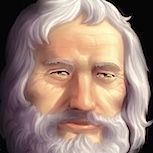
Euripides
480 – 406 BCE
Ancient humanitarian influence continuing today
Radical influence for the good, for equality, compassion, and understanding; Euripides became the best playwright of all time actively fighting against oppression, inequality, superstition, and war. He depicted the gods of his time as childish fantasies, women as the best civilizing force for men, ancient heroes as ordinary people, and sympathy as the best attitude toward all victims of war and social inequalities. Frequently shocking the status quo, he became the foundation for ancient education and the greatest ancient intellectual Greek inspiration, a force that continued through history, inspired the 18th and 19th century humanitarianism, and continues today.
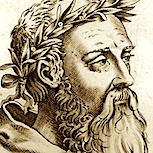
Heraclitus Ἡράκλειτος (of Ephesus, the "Weeping Philosopher")
535 – 475 BCE
A Greek Buddha
Lonely, self-taught wisdom pioneer who like the Buddha abdicated his inherited kingship; Heraclitus also like the Buddha stressed the ever-present quality of impermanence and change, the importance of humans waking up from unconsciousness, and the unity of opposites. Devoted to the principle of inscrutability, he was known as "the Obscure" and wrote only for the wise and not “the rabble.” Born just 28 years after the Buddha, he emphasized the central Buddhist doctrine of impermanence and is famous for his quote, "No man ever steps in the same river twice.” Also contemporary with Lao Tzu, he mirrored the teaching of yin and yang regarding the soul as being a mixture of fire and water, light and dark.
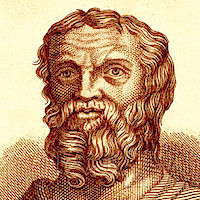
Herodotus Ἡρόδοτος
c. 484 - 425 BCE
“The Father of History”
“The Father of History” and first known historian to systematically collect and investigate facts, Herodotus described the purpose of his efforts “to prevent the traces of human events from being erased by time, and to preserve the fame of the important and remarkable achievements.” While the accuracy of his accounts is often questioned, he worked hard to corroborate his stories. From an internationally-minded port city and widely traveled, he describes many of his accounts from an eye-witness perspective. With an overarching theme of civilizations in conflict, he collected oral histories during his travels, thought about their meanings and interpreted them. Not only reporting on ancient science, he also speculated on scientific, cultural, geographical, and historical questions. His role in bringing ancient wisdom into modern understanding is immense.

Lao Tzu 老子 (Lǎozǐ)
604 BCE -
The poems translated here say more about Lao Tzu than could any commentary on his life. A huge influence on all of Chinese culture, much of Chinese literature and almost all of Chinese art, Lao Tzu’s teachings also extend to every aspect of life including politics to such an extent that he was claimed as an ancestor by the emperors of the Tang dynasty. Some call Zen “Taoism in Buddhist clothing” and these teachings continue to inspire people in all of the non-thought lineages. As Ursula Le Guin comments, “Of all the deep springs, this is the purest water.”
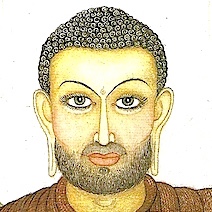
Mahākāśyapa 摩訶迦葉
5th C BCE
One of the Buddha’s principal disciples, Mahākāśyapa convened and directed the First Buddhist council and was the only one said to have understood the “Flower Sutra” - a teaching the Buddha gave by holding up a white flower and not using any words. Zen Buddhism traces its origin to this deep example of understanding the sense, not just the words. All true wisdom traditions seem to share this concentration on meditative direct experience rather than philosophy, rational creeds, or revealed scripture.
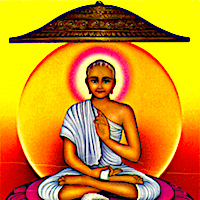
Mahavira (Vardhamāna)
540 – 468 BCE
"the great hero”
Reviver of the Jain tradition, 24th tirthankara, contemporary of the Buddha, and—like the Buddha—Mahavira left the wealth and power of his royal family to go on a spiritual quest. After 12 years of intense and ascetic meditation, he realized enlightenment and began a 30-year period of teaching. These teachings became some of the most important foundations of Jainism. The two major Jain sects differ in their understanding of Parshvanatha and Mahavira’s teachings. One believes their is no difference, the other that Mahavira expanded the scope of non-violence and began requiring monastic celibacy. HIs death and nirvana have become one of India’s most important holidays, the Diwali festival of lights.

Maitreyi
c. 7th century BCE
Symbol of enlightened feminine principle
A symbol for Indian intellectual women, "one of the most learned and virtuous women of ancient India,” poet, philosopher, and wife of the great sage, Yājñavalkya; Maitreyi studied, debated, taught metaphysics and wrote 10 hymns in the Rigveda, one of the four Hindu canonical sacred texts. Her dialog with Yājñavalkya in an Upanishad formed the foundation for Advaita, the oldest school of Vedanta that teaches and gives practices to help realize non-duality. In this dialog, her challenge to the male guru shows the equality of women in ancient India and inspires that realization today - a college in New Delhi is named after her.

Orpheus /ˈɔːrfiəs
7th century BCE
"Greatest poet and musician of all time"
Accepted by most ancient sources as a real person but also shrouded in myth and legend, Greeks venerated Orpheus as the greatest poet and musician of all time believing his music could charm animals, divert rivers, and even make rocks and trees dance. As prophet, musical archetype, and founder of the Orphic mysteries; his influence on art, poetry, film, opera, music, and painting continues into modern times. As well as influencing Stoic pantheism and the Neo-Platonists’ asceticism; he continued a mystic cult migrated from Egyptian Osiris that included the suffering, death, and resurrection of a divine son; judgments at death of heaven, hell, or purgatory; “original sin,” and a communion sacrament of eating a god’s body and blood; it became a basis for the Christianity flourishing today.
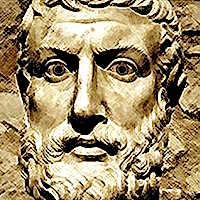
Parmenides
540 – 450 BCE
Grandfather of Western philosophy
Parmenides of Elea Παρμενίδης ὁ Ἐλεάτης (c. 540 - 450 BCE)
Father of Western logic, grandfather of Western philosophy, major influence on the development of science, promoter of the most paradoxical (contrary to appearances) vision of reality, and venerated by Plato and Aristotle; Parmenides taught that our experiences of “reality” are illusory, that the profound oneness of life makes change impossible, existence timeless, and that nothing either dies or is born. In The Way of Opinion, he explains the world of appearances, in which one's sensory faculties lead to conceptions which are false and deceitful. In The Way of Truth, he describes a mystical experience of absolute, unborn reality. These categories parallel our theme of “the words or the sense.”

Pericles
495 – 429 BCE
Disprover that all power corrupts
One of the greatest statesman and leaders in all of history, Pericles disproves or is at least an exception to the adage “power corrupts.” Though not without critics (including Plato); as general, politician untainted by corruption, orator and philosopher, he helped establish a Greek golden age, increased the power of democracy, and made Athens famous as the educational and cultural center of the ancient world. He also started projects that built most of the surviving structures on the Acropolis including the Parthenon.
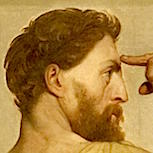
Phidias
480 – 432 BCE
Greatest Greek Sculptor
Greatest Greek sculptor, fashioner of the 43’ Statue of Zeus at Olympia (one of the Seven Wonders of the Ancient World), and close friend to Pericles; history credits Phidias with the development and design of Classical Greek sculpture. He supervised and helped create the great works on the Acropolis in Athens, designed the statues of Athena inside the Parthenon that had 2345 lbs of gold on just the robe, and a colossal bronze Athena Promachos, symbol for Athens and goddess of wisdom. His work was described as “the most beautiful images on earth,” all who could afford it made pilgrimages to it, and hundreds of years later a Roman author described his work as an addition to religion “equal to a god.”
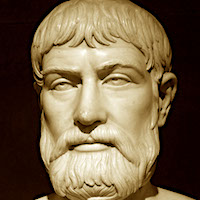
Pindar Πίνδαρος
522 – 443 BCE
Archetype of poetry
One of the always-praised but almost never-read writers, Pindar wasn’t even popular during his lifetime though he was sought out and paid high sums for eulogies. Although only a small fragment of his odes remain and none of his music and dance displays; enough of the creative artistry and complex, beautiful structures survive to give Pindar an immortal place in world literature. He became popular again during the Byzantine Era and again when his style was emulated for the revived 1896 Olympic Games, the Athens Olympics in 2004, and the London Olympics in 2012. Horace thought anyone trying to imitate Pindar would be like Icarus, sure to fail. The splendor of his imagery, imagination, and style have brought some modern scholars to regard his work as “an archetype of poetry.”

Protagoras
490 – 420 BCE
“The wisest man alive”—Socrates
Born poor and laboring as a porter, Protagoras was called by Socrates “the wisest man alive” and became a friend of Pericles, so respected that Plato wrote a book about him, and a philosopher so original that he started a thought revolution in ancient Greece with his theory of relativism. This led to an agnosticism that furthered science but aroused enough anger to expel him from Athens and have all copies of his books burned in the marketplace. His still famous statement that "Man is the measure of all things” continues his influence and his saying, “There are two sides to every question” has become a truism and idiom in most languages.
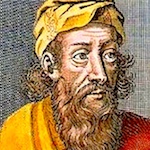
Pythagorus (of Samos)
570 – 495 BCE
"The most influential philosopher of all time"
The ancient Greeks called Pythagoras “the philosopher.” He discovered the numerical relationship between musical notes, the “music of the spheres,” gave geometry its main form, the Pythagorean theorem, and the name cosmos to the world. An elemental influence on Plato (The Republic considered based on the vegetarian, communistic community Pythagoras established) and the first to teach that the world is round and revolves around the sun, his influence extends to all of Western philosophy, Freemasonry, Rosicrucianism, mathematics, architecture, sculpture, art and music. Bertrand Russell considered him the most influential philosopher of all time.

Sappho
612 – 570 BCE
“The Poetess” and most famous Greek woman
The most beautiful singer of her age, a political force when only 19, one of the great “Nine Lyric Poets” of ancient Greece, called by Socrates, “The Beautiful,” by Plato the Tenth Muse, and “the Poetess” by all the Greek world; Sappho is the most famous Greek woman. In fear of her pen, politicians banished her twice and her poetry continued to inflame autocratic leaders for centuries – even Medieval Church leaders in Rome and Constantinople tried to burn all her 9 volumes of poetry in 1073 and remaining scraps of these weren’t found until 1897, some not until 2014. She started history’s first “finishing school” for girls and lived “laughing love’s low laughter… lost in the love trance."
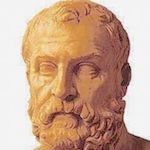
Solon
638 – 558 BCE
Founder of Athenian democracy
Poet, statesman, lawmaker, one of the Seven Sages of Greece and known for establishing the foundations of Athenian democracy; Solon wrote poetry and helped stop the decline in ancient Athens. At that time, not being able to repay a debt meant slavery - first of your children, then your wife, and finally yourself. As much as 92% of all Athenians were slaves. A skilled compromise negotiator, and respected for his wisdom and fairness, Solon was given power to change this. Establishing publicly funded brothels "democratize" the availability of sexual pleasure, he cancelled debts and contracts, freed slaves, and ended the causal system. This along with his beneficial trade legislation and standards resulted in an economic revival, a new golden age, and the beginning of democracy.
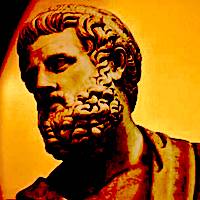
Sophocles Σοφοκλῆς
497 – 405 BCE
“The Wise and Honored One”
Author of 120 plays, known as “The Wise and Honored One,” most popular Athenian playwright for 50 years, champion wrestler, poet, musician, actor, politician, general, and priest; Sophocles initiated pioneering innovation in the presentation of drama including an emphasis on inner, psychological character development. Strikingly handsome, athletic, enriched and privileged by his family’s wealth from selling weapons during the Persian wars; Sophocles ironically developed a dark pessimistic fatalism. He ranked the unborn as the most blessed and those who die at birth next. His play, Oedipus Tyrannus became the most famous of all Greek dramas. Brought to court by a son fearful that he would bequeath his wealth to an illegitimate son from a prostitute, Sophocles defended himself by reading from a play. This not only won the case but garnered the honor of the judges escorting him home.

Sun Tzu 孙武 (Sun Zi)
544 – 496 BCE
HIstory's supreme strategist
A huge influence in China from the first emperor, Qin's Shi Huangdi who considered Sun Tau’ strategy invaluable in his success to Mao Zedong who partially credited to him his 1949 victory over Chiang Kai-shek; Sun Tau also became influential in the West during the twentieth century. It helped leaders unify Japan, generals in Viet Nam win over superior French and American forces, Colin Powell win the Gulf War and continues to help people all over the world involved in politics, the military, business, sports and any competitive endeavor. Sun Tzu uses Daoist principles and terms emphasizing victory over aggression, taking whole, how to be rather than what to do.
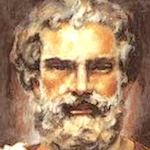
Thales of Miletus
624 – c. 546 BCE
“Father of Philosophy”
One of the “Seven Sages of Greece,” called the founder of Western Science and “Father of Philosophy,” Thales traveled to Egypt and studied with an Egyptian priest. He then returned to become ”the first Greek mathematician,” history’s first to use geometric deductive reasoning, to have a mathematical discovery attributed, and becoming the first to explain nature without myth or superstition, he set the direction for the golden age of Greek philosophy. Wanting to prove the practicality of philosophy and science, he applied it to business creating the first instance of using options and futures and to politics stopping a battle by predicting an eclipse.
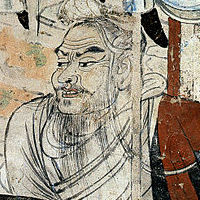
Vimalkirti विमल
600 – 500 BCE
Close disciple of the Buddha who extended his teachings to common people
One of the Buddha’s closest and most important disciples, Vimalkirti became known for his wisdom and ability to teach Dharma to not only monastics but to everyday, common people. Like the Buddha and born into a wealthy family, he also renounced his position and possessions but his teaching and influence extended back to people not willing to renounce so much. This helped shape the Buddhist traditions into welcoming everyone. Although sometimes considered legendary, teachings attributed to him on emptiness became a central theme in Buddhist philosophy and most traditions consider him an historical figure and a founding influence on the Chan and Zen traditions.
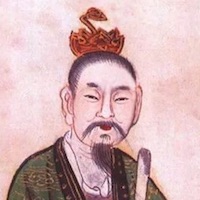
Wenzi 文子 (Wénzǐ)
(fl. 5th century BCE)
"Authentic Presence of Pervading Mystery.”
Close disciple of Lao Tzu, nobleman from the Jin state, astronomer, teacher of the Yueh state prime minister, inspiration for the famous commentary of the same name written by his disciples; Wenzi’s life is clouded in myth, magic, and superstition. The text itself - regarded the 4th main Taoist scripture after the Tao Te Ching itself, the Zhuang Zi (Chuang Tzu), and Lie Zi (Lieh Tzu) - was considered a forgery written much later until an archeological team discovered a copy written on bamboo strips in a a tomb buried in 55 BCE. In 742 CE, Tang emperor Xuanzong gave this book the name, "Authentic Presence of Pervading Mystery.”
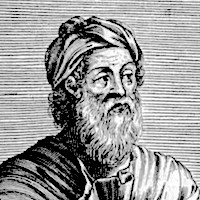
Xenophanes Ξενοφάνης ὁ Κολοφώνιος (Xenophanes of Colophon)
570 – 475 BCE
Nomad, belief-system critic, poet, and highly influential but greatly under-appreciated pre-Socratic Greek philosopher; Xenophanes traveled for 67 years teaching, "making enemies," and challenging traditional Greek values like athleticism and belief in anthropomorphic gods. Plato used many of his ideas in the Republic III, Aristotle deprecated him but then advanced many of his ideas when he wrote Metaphysics. Xenophanes realized early how stuck to tradition most contemporaries become and consciously wrote for future generations he believed (correctly) would be more open to his ideas.
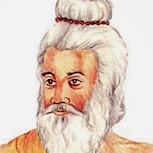
Yājñavalkya
fl. c. 7th century BCE
One of the earliest non-dual philosophers
Revered sage, major figure in the Upanishads, and one of the first philosophers in recorded history; no one could rival Yajnavalkya in debate. Called the greatest theologian of his time, and with his dialogues recorded in the Upanishads, he taught the great philosopher-king of Videha (modern day Nepal), Janaka who created an intellectual center for great sages that became the most important cultural and political center of South Asia. He described an “Absolute Self” and furthered a non-dual school of Hinduism that continues today. In later life he retired in a forest to become a wandering ascetic personifying a tradition popular through the centuries of Indian history.
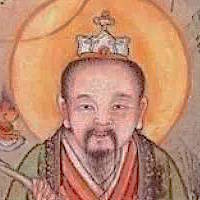
Yin Xi 關尹子
536 – 596 BCE
Lao Tzu’s first disciple and Taoist patriarch
Yin Xi, Yin Hsi, Guan Yin Zi 關尹子 (fl. 6th century BCE)
Astronomer from a royal observatory said to have seen purple clouds drifting in from the east and taken them as a symbol that a great sage would soon be coming through that area, Yin Xi went to the one place everyone traveling to that area would have to pass through, the Hanku Pass, a strategic and narrow ten-mile canyon between the Qin and Zhou states. Recognizing Lao Tzu, he asked to become his disciple, became his first student, and requested the teachings that became the Tao Te Ching. Known as the “Master at the Beginning of the Scripture,” Lao Tzu’s first disciple, Taoist patriarch and founder of the Yin Xi Lineage; he became the prototype “Taoist” and inspiration for the development of religious Taoism.

Zarathushtra زرتشت (Zoroaster)
628 – 551 BCE
Said to have laughed out loud the day he was born and considered a true prophet by Islam, an important influence on Judaism, the Greek philosophers, and on philosophy in general, Zarathushtra founded Zoroastrianism, the official religion of Persia from 600 BCE until 650 CE when Islam took over. A shaman called inventor of astrology, he based his teachings on what we now call the Golden Rule, founded the Magi tradition and opposed the oppressive caste system of his time. Although against polytheism and emphasizing belief, his religion taught the meaningfulness of each small action increasing goodness or evil. From it we inherit common symbols like magic, heaven and hell, purgatory, Satan, the 3 Wise Men, angels, Christmas, and the Last Judgment.
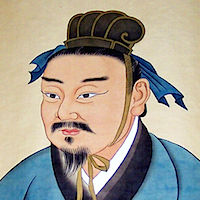
Zisi 子思 (Kong Ji or Tzu-Ssu)
481 – 402 BCE
Confucius' grandson and early influence on Neo-Confucianism
The only grandson of Confucius, writer of the influential Doctrine of the Mean, and teacher of Confucian thought to Mencius; Kong Ji evolved his grandfather’s insights into the difference between real and believed truth, the relativity of understanding, and the possibilities of learning lessons from nature and applying them to everything from politics to daily life. His writings were a deep influence on Zhu Xi and the Neo-Confucian movement becoming one of “The Four Books” that set the educational and political framework in China and throughout Asia for more than 700 years, from c. 1150 to 1905.
Quotes (1 Quotes)

“How revealing it is to find Confucius—some 500 years before Christ—writing about 'the wise men of antiquity'; the Chinese apparently, had philosophers 1000 years before Confucius, before Buddha, Isaiah, Democritus, and Socrates.”
Comments: Click to comment
Chinese Eras
Xia Dynasty 夏 (2100 – 1600 BCE)
Shang Dynasty 殷代 (1600 – 1046 BCE)
Western Zhou 西周 (1046 – 771 BCE)
Eastern Zhou 東周 (770 – 256 BCE)
Spring and Autumn period 春秋时代 (770 – 476 BCE)
Warring States period 春秋时代 (476 – 221 BCE)
Qin Dynasty 秦朝 (221 – 206 BCE)
Three Kingdoms 三國時代 (220 – 280 CE)
Southern and Northern 南北朝 (420 – 589 CE)
Tang Dynasty 唐朝 (618 – 907 CE)
5 Dynasties 10 Kingdoms (907 – 960 CE)
5 Kingdom of Dali 大理国 (937 – 1253 CE)
Western Xia 西夏 (1038 – 1227 CE)
Southern Song (1127 – 1279 CE)
Comments (0)